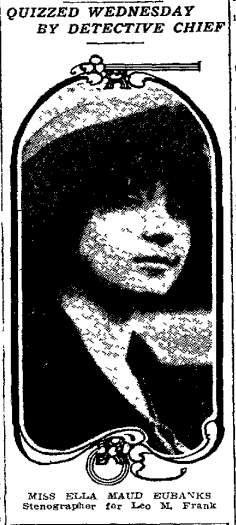
Another in our series of new transcriptions of contemporary articles on the Leo Frank case.
Atlanta Constitution
Thursday May 1st, 1913
Following Mechanic Barrett’s declaration that there were two men at work Saturday at noon on the top floor of the factory building, Coroner Donehoo ordered detectives to accompany the machinist to the plant and bring the two employees to police headquarters.
They were brought immediately into the inquest. Their names were given as Harry Denham and J. Arthur White. Denham was first placed on the stand. His examination began immediately upon arrival.
“Did you see the blood on the lathing machine?”
“I saw it Monday.”
“Were you on that floor Saturday?”
“No. I was on the top floor.”
“Did you see Frank at any time of the day?”
“Yes.”
Asked When They Would Finish.
“Did he offer you holiday as the others had been given?”
“No. He came up to where we were working and asked us if we would be through by 1 o’clock.”
“Did you ever know Mary Phagan?”
“I knew her only by sight.”
“Did you see her Saturday?”
“No, I never left the top floor.”
“Were you aware of everything which transpired in the building during the time you were within it?”
“No. A person could have come into the plant and we never would have known anything about it.”
“How long have you worked with the pencil company?”
“Three years.”
“Have you ever heard of couples going into the building at night?”
“No.”
“Have you ever been in the partitioned room in Frank’s office?”
“No.”
Apparently Not Nervous.
“When Frank came to where you were working at 3 o’clock Saturday afternoon to tell you that you could quit, did he seem nervous or agitated?”
“Not that I noticed. He didn’t come all the way. He came to the head of the steps and called to us.”
“Did you go down with him?”
“No. He went down ahead of us.”
“Was he in his office?”
“Yes. When I went down I borrowed $2 from him.”
“Where did you leave him?”
“Writing at his desk.”
“Was anyone else in the factory?”
“No one of whom I know, except Frank.”
“How many rooms are there in Frank’s office?”
“Only two—his and the stenographer’s.”
“Can you see any one in the private office from the stenographer’s room?”
“Yes, if you try to.”
“As you left the building Saturday afternoon, did you notice in Frank’s office any change from the customary state in the condition of furniture?”
“No.”
“Who uses the office beside Frank?”
“Mr. Darley, the assistant superintendent.”
Left Building for a While.
Arthur White’s story coincided with that told by Denham. He was examined mostly, though, along different lines.
“Who was in the building besides you, Denham and Frank?”
“My wife came up shortly after noon. Mr. Frank came to her and told her he was going to lock up and advised her to leave the building. He also asked us if we didn’t think we’d bet-told him we weren’t through. When we told him we weren’t through, he said for us to stay in the place until he returned, as he was going out on the street. He came back at 3:08 and we punched out at 3:10 o’clock.”
“When did Frank leave?”
“He left right away.”
“Do you know where he went?”
“No. He locked us in the building though.”
“Is there a closet in Frank’s office?”
“Yes, there is. A kind of wardrobe.”
“Did it look big enough to hold a human body?”
“Yes. It was about nine feet high and four feet wide.”
“Where was it located?”
“Behind the door of his private office.”
“Was the door closed?”
“I didn’t notice.”
* * *
Atlanta Constitution, May 1st 1913, “Frank Not Apparently Nervous Say Last Men to Leave Factory,” Leo Frank case newspaper article series (Original PDF)